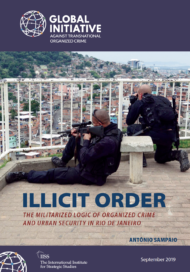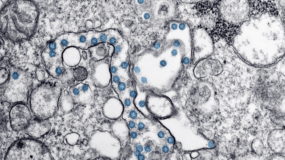Recent changes in crime-fighting tactics demanded by Brazil’s Supreme Court have called into question the efficacy of the state’s militarized approach in Rio.
The first six months of 2020 painted a bleak security picture in Brazil, with the year shaping up to be the worst on record in terms of people killed by police. At least 3 148 people were killed by police throughout the country – an increase of 7% compared to the same period in 2019. The number of police officers killed in Brazil also increased in the first six months of 2020, by 24%. Overall, Brazil experienced a 6% increase in violent deaths during the first six months of 2020, even with fewer people on the streets due to stay-at-home restrictions.
Brazilian President Jair Bolsonaro and Governor Wilson Witzel of Rio de Janeiro state have both argued that empowering the police is the only way to defeat the country’s highly developed criminal organizations. During his 2018 campaign, Bolsonaro pledged an all-out war on crime, sometimes referred to as política de confronto (‘confrontational policy’). As president, Bolsonaro promised that criminals would ‘die in the streets like cockroaches’ and that he would ‘dig graves’ under anti-crime laws advanced by his administration. In Rio, Witzel implemented a ‘zero tolerance’ policy, permitting the strafing of suspected criminals from helicopters.
This security approach has exacted an astounding human toll. Police killed more than 1 800 people in Rio de Janeiro alone last year, and the numbers from the first half of 2020 suggested that the lethal trend of confrontation was only increasing. But many Brazilians have come to accept these tactics as an unavoidable aspect of the fight against organized crime, with Brazil’s leaders pointing to the fall in violent crime in 2019 in many urban areas normally plagued by criminal activity as proof of the approach’s success.
However, a recent development has provided a rare opportunity for scholars to analyze the efficacy of alternative crime-fighting strategies. In early June, Brazil’s Supreme Court issued a preliminary decision, later upheld, suspending police raids in Rio de Janeiro’s favelas during the coronavirus pandemic, except under extraordinary circumstances that require the approval of the state prosecutor’s office.
It is too early to draw firm conclusions about the effects of the Supreme Court’s decision, but recent data from Rio de Janeiro provides reason to be cautiously optimistic about the efficacy of a less militarized approach. After the Brazilian Supreme Court suspended the raids, killings by police in June and July fell by 76% in Rio compared to the same period last year, having been up 43% in April 2020 compared to the same month in 2019. (Since the restrictions went into effect, the police have still engaged in nearly 100 operations in favelas, authorized by the state prosecutor.)
Initial statistics of homicide rates in Rio also point to a downward trend. In March and April 2020, just as the coronavirus increased its grip on Brazil, Rio’s criminal factions ramped up their activity, contributing to an increase in homicides in both of those months. However, violent deaths in Rio during the first two months of the moratorium on police raids fell by 40% compared to the same period in 2019. Further, the overall homicide rate in Rio de Janeiro experienced an 11% reduction in the first half of 2020, meaning that a cessation in police raids has not interrupted this larger downward trend. Indeed, Rio is currently experiencing its lowest rate of violent crime since 1999, but owing to the aforementioned spikes in March and April 2020, it is likely that the overall figures are predominantly driven by a steep drop in recent months.
Of course, the biggest caveat to any reduction in Rio’s homicide rate is the overlay of the coronavirus pandemic and its still-unknown effect on organized crime. In countries such as El Salvador, which also suffers from endemic violence at the hands of criminal groups, stay-at-home orders have curtailed homicides by keeping its notorious street gangs inside. In Mexico and Brazil, however, organized crime groups may have adapted better to the pandemic circumstances. For instance, cocaine interdiction at European ports has risen 20% over the past year, with most ships originating from the Brazilian ports Santos and Fortaleza, where organized crime groups are known to operate. Rio’s criminal groups have also grown their governance capacities (often through highly publicized activities) and diversified their business models during the pandemic.
A spike in Rio’s homicide rate would usually accompany rising narcotics exports and an increase in governance capacity in the favelas. The reduction in Rio’s homicides is certainly a welcome reversal of this past trend. Nevertheless, several factors urge caution when drawing conclusions: the data is limited; violent crime is a notoriously difficult phenomenon to predict; criminal groups may be biding their time against the state; and there could be another as-yet-unidentified variable bearing on these statistics, beyond the Supreme Court’s temporary prohibition of police raids. Rio de Janeiro is also poised to experience another period of state instability that could affect its security policy, due to the removal of Witzel from office in early September on charges of corruption. Further, with signs that Brazil’s coronavirus outbreak may be easing, the Supreme Court may decide to reverse the ban on police raids as stay-at-home orders lift, reducing the prospects for a paradigm shift in Brazil’s crime-fighting strategies.
Although the dynamics between favela communities and criminal groups goes well beyond the use of violence, the homicide rate is still one of the best proxies to gauge the effectiveness of crime-fighting strategies in Brazil. In Rio de Janeiro – usually one of Brazil’s most violent, murder-prone and insecure cities – crime is at a historic low. A reduction in Rio’s homicide rate alongside a dramatic decline in the number of police raids indicates that state and federal governments may be overstating the centrality of these raids to homicide-reduction efforts. But whether such preliminary evidence persuades Brazil to commit in the long term to the difficult work of dismantling criminal groups without repeated and violent incursions remains an open question.
Policiamento no Rio: para além da política de confronto?
Recentes mudanças nas estratégias de luta contra o crime, demandadas pelo Supremo Tribunal Federal, puseram em pauta novamente a eficácia da abordagem militarizada levada a efeito na cidade do Rio.
Os primeiros seis meses de 2020 vinham pintando um quadro sombrio para a segurança pública brasileira: o ano caminhava para ter o registro do pior número de mortes relacionadas à atividade policial. Só no primeiro semestre foram registradas pelo menos 3.148 pessoas mortas pela polícia em todo o país – um aumento de 7% em relação ao mesmo período em 2019. O número de policiais mortos no Brasil também aumentou nos primeiros seis meses de 2020, chegando ao percentual de 24%. Em números absolutos, o Brasil presenciou um aumento de 6% nas mortes violentas nos primeiros seis meses de 2020, isso mesmo levando em consideração que um número menor de pessoas estava circulando nas ruas devido às restrições impostas em razão do coronavírus.
O presidente Jair Bolsonaro e o governador do Estado do Rio de Janeiro Wilson Witzel têm argumentado que o fortalecimento da polícia é a única maneira de combater as altamente desenvolvidas organizações criminosas que operam no país. Durante sua campanha eleitoral em 2018, Bolsonaro prometeu uma guerra total contra o crime, às vezes referida como política de confronto. Como presidente eleito, Bolsonaro chegou a afirmar que criminosos ‘morreriam nas ruas como baratas’ e que ele ‘cavaria covas’ sob as leis anticrime avançadas por sua administração. No Rio, Witzel implementou uma política de ‘tolerância zero’, permitindo que policiais atirassem em suspeitos criminosos diretamente de helicópteros.
Esta postura em relação à segurança pública acarretou um custo humano estarrecedor. A polícia matou mais de 1.800 pessoas só no Rio de Janeiro no ano passado, e os números do primeiro semestre de 2020 sugeriram que a letalidade decorrente desse confronto só estava aumentando. Entretanto, muitos brasileiros passaram a aceitar essas estratégias como um aspecto inevitável do combate ao crime organizado, especialmente devido ao fato de que os líderes políticos apontavam como prova do sucesso dessa abordagem uma queda em 2019 da criminalidade violenta em áreas urbanas notoriamente dominadas pela atividade criminosa.
Contudo, um fato recente proporciona aos estudiosos uma oportunidade única para a análise da eficácia de medidas repressivas de combate ao crime. No início de junho, o Supremo Tribunal Federal proferiu uma decisão liminar, a qual foi posteriormente confirmada, suspendendo as incursões policiais nas favelas do Rio de Janeiro durante a pandemia do coronavírus. A proibição só poderia ser excepcionada em circunstâncias extraordinárias, as quais requereriam a aprovação do Ministério Público Estadual.
Apesar de ser ainda muito cedo para tirar conclusões categóricas sobre os efeitos da decisão do STF, os dados recentes do Rio de Janeiro fornecem motivos para sermos cautelosamente otimistas e refletir sobre a eficácia de uma abordagem menos militarizada. Após o Supremo Tribunal Federal suspender as operações policiais durante a pandemia, as mortes ocorridas com envolvimento policial no Rio caíram 76% nos meses de junho e julho, se comparadas ao mesmo período do ano passado. Essa queda seguiu o aumento de 43% que havia sido notado em abril de 2020 em relação ao mesmo mês de 2019. (Desde que as restrições entraram em vigor, a polícia ainda se envolveu em quase 100 operações em favelas, autorizado pelo Ministério Público Estadual.)
As estatísticas iniciais das taxas de homicídios no Rio também apontam para uma tendência de queda. Em março e abril de 2020, conforme o coronavírus expandia suas garras sobre o país, as facções criminosas do Rio também ampliaram sua atividade, contribuindo para o aumento no número dos homicídios nos dois referidos meses. No entanto, o número de mortes violentas no Rio nos dois primeiros meses da proibição de incursões policiais caiu em 40% em relação ao mesmo período de 2019. Além disso, a taxa global de homicídios no Rio sofreu uma redução de 11% no primeiro semestre de 2020, o que significa que a cessação das batidas policiais não interrompeu essa tendência maior de queda. De fato, o Rio vive atualmente sua menor taxa de crimes violentos desde 1999, mas devido aos picos de aumento mencionados em março e abril de 2020, é provável que os números globais decrescentes do primeiro semestre tenham sido predominantemente impulsionados pela queda acentuada nos últimos meses.
Claro que a maior ressalva em relação a possíveis causas na redução na taxa de homicídios no Rio reside no fato de que os números foram colhidos paralelamente a ocorrência da pandemia do coronavírus, cujos efeitos sobre o crime organizado são ainda desconhecidos. Em países como El Salvador, que também sofre pela violência endêmica causada pela atuação de grupos criminosos, as ordens de permanência em casa levaram de fato a uma redução no número de homicídios, já que manteve suas conhecidas gangues confinadas em casa. No México e no Brasil, no entanto, grupos criminosos parecem ter se adaptado melhor às circunstâncias geradas pela pandemia. Por exemplo, a apreensão de cocaína nos portos europeus aumentou 20% no último ano, com a maioria dos navios originários dos portos brasileiros Santos e Fortaleza, pontos conhecidamente utilizados pelo crime organizado. Os grupos criminosos do Rio também cresceram suas capacidades de governança (as quais muitas vezes foram altamente divulgadas) e diversificaram seus modelos de negócio durante a pandemia.
O aumento na taxa de homicídios no Rio normalmente viria acompanhando o aumento das exportações de narcóticos e o aumento da capacidade de governança nas favelas. A redução dos homicídios no Rio é certamente uma reversão bem-vinda dessa tendência. No entanto, vários fatores pedem cautela ao tirar essas conclusões: os dados são limitados; a criminalidade violenta é um fenômeno notoriamente difícil de prever; grupos criminosos podem até mesmo estar ganhando tempo contra o Estado; e pode ainda haver outra variável não identificada nessas estatísticas e que vá além da proibição das batidas policiais nas favelas determinada pelo STF. Outro fator que pode colocar o Rio de Janeiro em outro período de instabilidade e afetar sua política de segurança foi a remoção do governador Witzel do cargo sob acusações de corrupção. Além disso, com sinais de diminuição do surto de coronavírus no Brasil, o STF pode reverter a proibição de incursões policiais, reduzindo as perspectivas de uma mudança de paradigma nas estratégias brasileiras de combate ao crime à longo prazo.
Embora a dinâmica entre as comunidades nas favelas e os grupos criminosos vá muito além do uso da violência, a taxa de homicídios ainda é um dos melhores índices para se avaliar a eficácia das estratégias de combate ao crime organizado no Brasil. No Rio de Janeiro – que geralmente é uma das cidades mais violentas e inseguras do Brasil, propensa a registrar a ocorrência de alto número de assassinatos – o registro de crimes violentos encontra-se em um nível historicamente mais baixo. Uma redução da taxa de homicídios no Rio, ao lado de uma queda drástica no número de batidas policiais, indica que os governos estadual e federal podem estar exagerando na centralidade dessas operações policiais nos esforços para redução de homicídios. Entretanto, se tais evidências preliminares convencerão o Brasil a se comprometer a longo prazo com o difícil trabalho de desmantelamento de grupos criminosos sem incursões repetidas e violentas nas favelas permanece uma questão em aberto.



